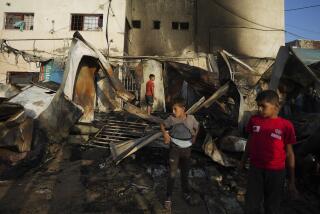U.S. Lobbies for Deadline on Gulf Crisis : Hussein Says Many Iraqis Have Died Due to Embargo
- Share via
The Bush Administration lobbied hard today for U.N. Security Council approval of military action to liberate Kuwait unless Iraq withdraws its troops by Jan. 1, while Saddam Hussein said “many” Iraqis have died through lack of food and medicines.
The proposed resolution was circulated as the council prepared for today’s start of a weeklong debate on the Persian Gulf crisis. If adopted, it will mark the strongest step taken by the council since the Iraqi leader invaded his oil-rich neighbor Aug. 2.
The Jan. 1 deadline “is not locked in concrete,” one U.S. official said. This leaves room for more maneuvering as the Administration tries to maintain an international alliance against the invasion amid Soviet reservations about using military force without trying further diplomacy.
The official, who spoke on condition of anonymity, noted that Secretary of State James A. Baker III had demanded that the Iraqi invaders leave Kuwait by the end of the year. “We’ve just kind of formalized it” in the proposed resolution, he said.
The resolution was circulated among the other permanent members of the Security Council--Britain, France, China and the Soviet Union--all of which have the power to block it.
Hussein’s remark on the shortage of food and medicines was the strongest indication to date that U.N. sanctions imposed on Iraq after its invasion of Kuwait are taking their toll. No specific death toll was given.
“If we go to hospitals and ask for lists, we will find that we are faced with large numbers of people who died because of the lack of food and medicine,” Hussein said on state television during a meeting with relatives of three American men held hostage by Iraq and whom he freed today.
Hussein, who last week offered to free 2,000 Western and Japanese hostages held in Iraq over a three-month period starting on Christmas Day, agreed in response to a plea by their relatives to let the three leave.
Diplomats knew the names of only two of the three--John Stevenson and Fred Harrington.
“We feel fantastic because we are going home. We met with the president, and he is a very nice man,” said Stevenson’s twin sister, Mary.
The proposed U.S. resolution will refer to force indirectly by saying that if Iraq does not pull its forces out of Kuwait, “all necessary means” will be used to get them out, a U.S. official said.
U.S. officials have said they do not expect the Soviet Union and China to block a resolution on force but they raised the possibility that the two nations seek softer language than the United States prefers. Britain and France are expected to back a resolution authorizing force.
Another U.S. official said the draft amounts to a compromise that Baker expects to be adopted by Thursday--one not authorizing immediate action, but allowing action sooner than the two months suggested by the Soviets.
More to Read
Sign up for Essential California
The most important California stories and recommendations in your inbox every morning.
You may occasionally receive promotional content from the Los Angeles Times.













